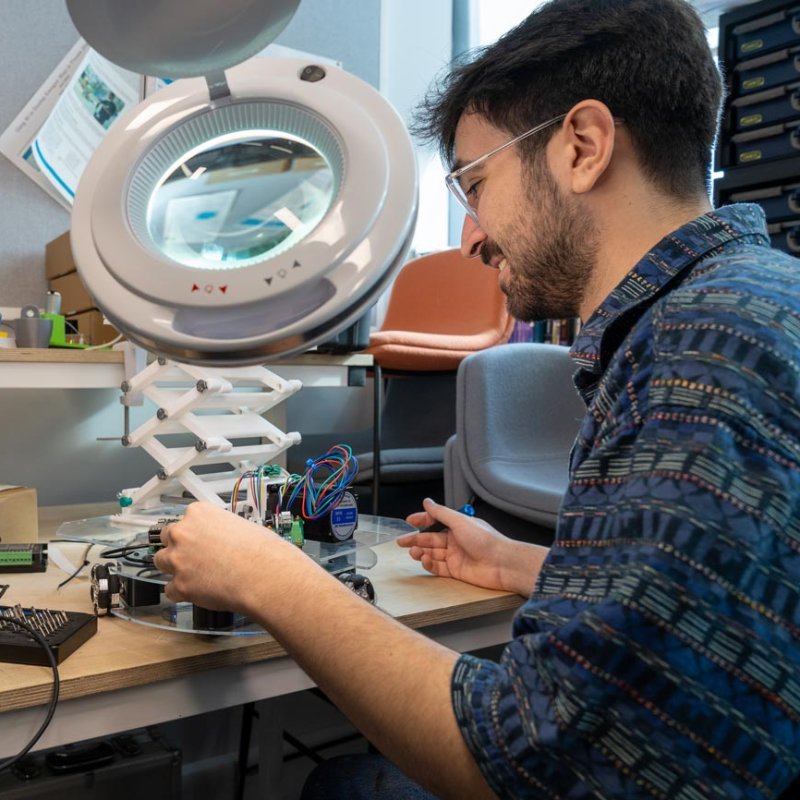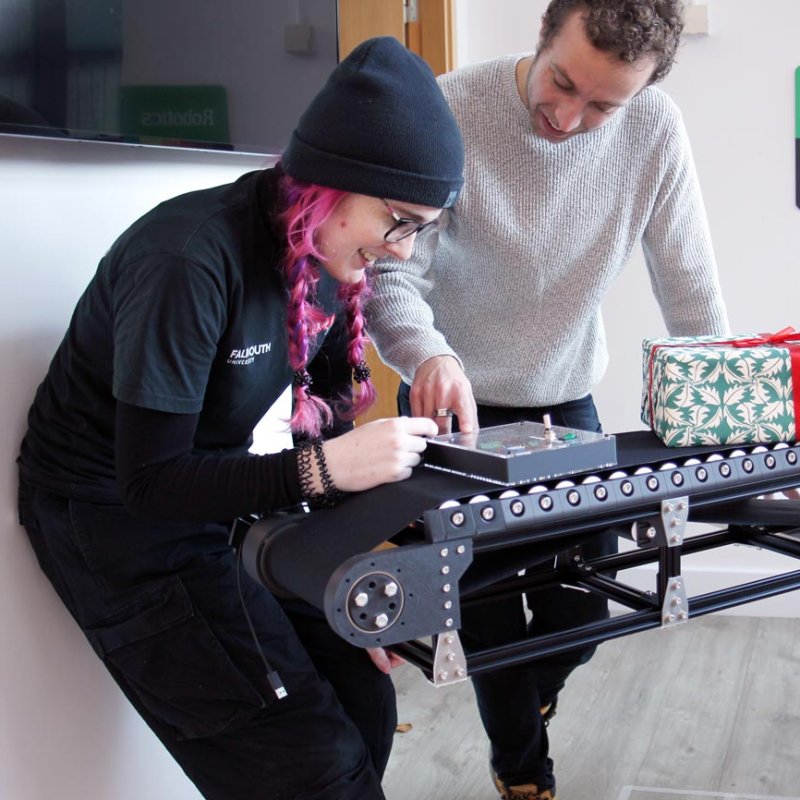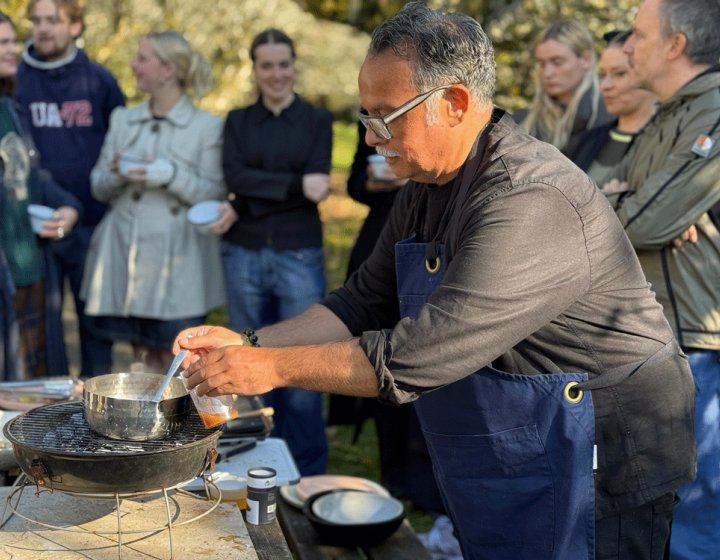What is Creative Computing?

In this article, Senior Lecturer in Computing, Matt Watkins explores what creative computing is and how it’s transforming the digital experiences that surround us every day.
What is creative computing?
Creative computing is about shaping the technologies that shape us. It explores how technology can be used as a creative medium; a space where curiosity, design and programming come together to make the future more imaginative, human and connected.
In a rapidly evolving digital world powered by artificial intelligence and automation, creativity and computing no longer stand apart. They inform and amplify one another, forging new ways of thinking at the intersection of art and technology.
Creative computing spans everything from creative coding and digital storytelling to virtual production, immersive experience design and animatronics. Practitioners approach this new world as innovators: experimental in approach, ethically aware in practice, and confident at crossing disciplinary boundaries to shape the next generation of digital experiences.
A degree in Creative Computing gives you the skills and mindset to use imagination and technology to design, invent and transform the digital world.
What jobs can you get with a Creative Computing degree?
A degree in Creative Computing opens doors to exciting careers that blend creativity, technology and innovation. Graduates shape the future of digital experiences across sectors such as games, design, film, software and emerging technologies.
In interactive and immersive media, you might work as an Interactive Media Developer, XR Developer or Immersive Experience Designer, building virtual worlds and interactive environments. In entertainment, roles like Technical Artist, Gameplay Engineer or VFX Artist can take you from AAA game studios to live events and theatre.
Those drawn to design and user experience often become UX/UI Designers, Interaction Designers or Service Designers, crafting the interfaces that shape how people engage with technology. If you’re more technically minded, software development roles such as Front-End Developer, Full Stack Developer, or App Developer let you build creative, user focused applications.
Graduates also find opportunities in creative media, working as Digital Artists, Motion Graphics Designers or Creative Coders, and in emerging fields as Creative AI Specialists, Data Visualisation Designers, or Computational Designers.
Whatever your chosen path, a degree in Creative Computing gives you the skills and mindset to use imagination and technology to design, invent and transform the digital world.

What skills do you need for a career in creative computing?
A career in creative computing calls for both technical know-how and creative curiosity. Ideally, you'll be just as passionate about the technical aspects of working with software and hardware as you are about telling stories, connecting with people and inspiring change. It’s about blending logic with imagination. You’ll need a foundation in mathematical thinking, programming, and digital design, along with an understanding of how humans interact with technology.
Practitioners learn to problem solve and think creatively, using code and hardware as tools for expression. The field encourages hands-on experimentation, transdisciplinary collaboration, and critical reflection on the social and ethical dimensions of technology. Knowledge in areas such as user experience, interactivity and data visualisation are especially valuable, as they allow you to turn complex technologies into expressive, human-centred experiences.
Equally important are professional skills: communication, collaboration and the confidence to dare. Projects often involve teamwork, so strong communication, collaboration, and project management abilities are essential. You'll need the confidence to take creative risks, the resilience to learn through experimentation and the agility to keep exploring emerging tools and technologies. Being open-minded, adaptable and reflective will help you thrive in an industry that's constantly evolving.
Is a degree in creative computing worth it?
If you want to combine creativity with technical skills and play a part in shaping the future of digital innovation, a Creative Computing degree will equip you with the skill and experience to do just that. A Creative Computing degree gives you the tools to not only understand how technology works, but how to use it innovatively, designing systems, apps and experiences that people love to interact with.
The skills you develop are highly transferable and in demand across industries such as games, film, television, theatre and heritage. Employers are increasingly looking for graduates who can think creatively about the future, not just technical specialists, but imaginative problem solvers with the ability to apply advanced digital skills in new and unexpected ways.
Beyond career opportunities, studying Creative Computing invites you to explore how art and technology can work together to tell stories, address real world challenges and inspire change, making it a degree that is as personally rewarding as it is professionally valuable.


Why study Creative Computing at Falmouth University?
Falmouth University has a long-standing reputation as a hub of innovation; it is where art, design and technology come together to shape the future of creativity. Studying Creative Computing at Falmouth means joining a vibrant community rooted in the University's arts heritage, where people are constantly experimenting, inventing and bringing new ideas to life at the nexus of creativity and technology.
You'll have opportunities to collaborate with students across disciplines including Fashion, Film, Games, Theatre Arts and Heritage projects with the Centre for Blended Realities. These collaborations mirror how the creative industries really work, helping you develop a professional mindset, a diverse skill set and a portfolio that reflects your individuality and ambition.
Guided by experienced lecturers and active practitioners, you’ll study in professional studios including our new state-of-the-art advanced manufacturing facilities. These feature production-grade 3D scanners and printers capable of working with nylon, resin, and metal, as well as immersive VR/AR technologies that support cutting-edge design and prototyping.
As an affiliate of the British Computer Society, the Creative Computing course ensures you graduate with recognised technical standards alongside a strong creative edge that employers in digital and creative sectors value highly.
At Falmouth University, innovation and entrepreneurship are part of everyday life. You'll be encouraged to experiment, take risks and turn ideas into real projects, products or start-ups. From hackathons and industry briefs to creative residencies and showcase events, you'll test your ideas in real-world contexts and make valuable professional connections.
Falmouth's coastal setting and focus on sustainable innovation make it an inspiring place to imagine, create and invent. You'll graduate as a skilled technologist and creative thinker ready to shape the digital world of tomorrow.




